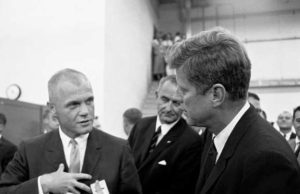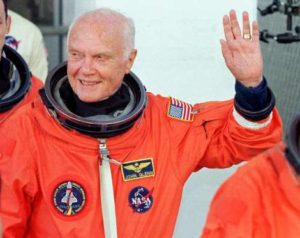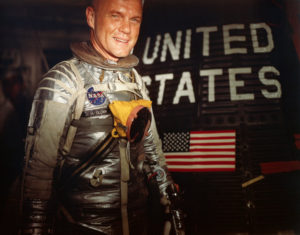
A great American life has come to an end.
We shouldn’t mourn John Glenn’s death, which was announced this afternoon. We should celebrate what this man accomplished during his 95 years among us.
What a man! What a life! What an extraordinary legacy he leaves!
I almost feel as though I’ve lost a member of my family.
Glenn and six other Americans burst onto the scene in the late 1950s when a newly formed agency, NASA, selected these men to become the first Americans to fly into space.
Glenn would be third of them. He was the first American to orbit the planet.
This is just one chapter of this great man’s life.
He joined the Marine Corps. He flew combat missions during the Korean War. Then he became a test pilot. Then NASA selected him to fly into space. He took three quick trips around Earth, returned home and didn’t fly again into space again for another 36 years.
In the meantime, he got elected to the U.S. Senate from Ohio, ran or president once in 1984. Along the way, he became friends with presidents, princes and potentates.

In 1998, he flew aboard the space shuttle Discovery. Sen. Glenn had a distinct advantage over two other members of Congress who flew previously into space — U.S. Sen. Jake Garn, R-Utah, and U.S. Rep. Bill Nelson, D-Fla. The Discovery flight crew and its support team didn’t have to translate their unique language to Glenn as they prepared for their flight. Glenn was fluent in astronaut-speak.
He boarded Discovery and the ship roared off the pad as the public address announcer told the world about the launch of the shuttle carrying “six astronaut heroes … and one American legend.”
***
Why the family-like connection with Glenn?
My mother and I were addicted to watching these early Mercury launches. We would awaken early and wait, and wait and wait some more for these rockets to blast off.
On Feb. 20, 1962 — after an interminable number of weather-related delays, holds, and mission scrubs — Mom and I watched on our black-and-white TV as Glenn Mercury-Atlas rocket roared into space.
The flight lasted about five hours. Then he splashed down — and came home a hero. They had a ticker-tape parade in New York. President Kennedy toasted him at the White House.
John Glenn was a glamorous kind of guy. Ruggedly handsome, he fit central casting’s description of a test pilot-turned astronaut.
There’s perhaps a touch of irony that Glenn would be the final Mercury astronaut to pass on. He was the oldest among them; Glenn was 40 at the time of his first flight aboard Friendship 7 in 1962.
So it is, then, that we remember this great American.
I’m thinking at this very moment of something his late Mercury colleague Scott Carpenter said to Glenn as his friend sat atop the rocket waiting to be blasted into space.
Godspeed, John Glenn.


